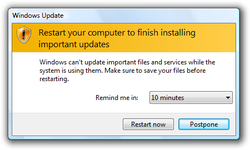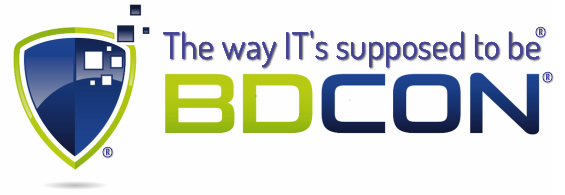
A recent ArsTechnica Article discusses an update Microsoft release to fix a long-time, nagging hole in internet explorer. The hole allowed hackers to install malicious software onto users computers in order to take control of their machines to perform all sorts of nefarious tasks. Still, many people that use IE as their primary browser will ignore warnings from Microsoft to update their PC's because they're to busy to worry about that sort of thing right now. What these people don't understand, is that a short upgrade process is going to be the least of their worries if they become victim to a hacker that utilizes the exploit.
The important point to understand is that when that little bubble in the taskbar pops up to notify you that updates are available, it should be treated as an urgent message. Imagine for a second, you come home from work to find a note in you mailbox from the manufacturer of your oven. The note states that the model you own has a 50% chances of spontaneously bursting into flames and you should schedule a repairman to come fix the problem right away. How long are you going to wait? Obviously, the ramifications of your oven exploding are a bit more dire than having your PC hacked but the latter can cause a nightmare for you or your business.
Malware programmers are very talented people. They have the ability to create software that can wreak havoc on your life and tuck all that code into a very small package. On an individual basis, they can access all of your online activity by activating a keylogger that tracks every keystroke you type and sends that back to someone to sift through to find your bank and credit card information, social media logins, email accounts and anything else they can take advantage of. On a corporate level, they can do the same thing but now they've accessed not only the end-users information, but potentially that of your clients as well. Think it can't happen to you? It can. To get an idea of just how common it is for companies to suffer a data breach, check out this site to see how many have affected the residents of New Hampshire alone.
So what's the best way to avoid this? The foremost and easiest way to protect yourself and your network is to keep Windows updated. Those updates that Microsoft pushes out should be considered a top priority in your company. Is it convenient? No. Look, we know it's a pain to have to reboot when you're working on something and have 3 documents open and a browser with 9 tabs that have all of your sources up. Is looking all that up again worse than having to cancel all your credit cards or having to send out a notification to your clients that they have to cancel their cards? You know the answer.
The good news is, we're happy to help you make the whole process easier. We can arrange for the updates to download and install automatically at off-peak hours. All of the machines on your network can be consistently updated to the latest version of windows. Including the oft-overlooked servers. Give us a call, and we'll walk you through how it works. You'll be thankful you did. If you choose not to, some guy in a country ending in "-stan" will be thankful you didn't.
The important point to understand is that when that little bubble in the taskbar pops up to notify you that updates are available, it should be treated as an urgent message. Imagine for a second, you come home from work to find a note in you mailbox from the manufacturer of your oven. The note states that the model you own has a 50% chances of spontaneously bursting into flames and you should schedule a repairman to come fix the problem right away. How long are you going to wait? Obviously, the ramifications of your oven exploding are a bit more dire than having your PC hacked but the latter can cause a nightmare for you or your business.
Malware programmers are very talented people. They have the ability to create software that can wreak havoc on your life and tuck all that code into a very small package. On an individual basis, they can access all of your online activity by activating a keylogger that tracks every keystroke you type and sends that back to someone to sift through to find your bank and credit card information, social media logins, email accounts and anything else they can take advantage of. On a corporate level, they can do the same thing but now they've accessed not only the end-users information, but potentially that of your clients as well. Think it can't happen to you? It can. To get an idea of just how common it is for companies to suffer a data breach, check out this site to see how many have affected the residents of New Hampshire alone.
So what's the best way to avoid this? The foremost and easiest way to protect yourself and your network is to keep Windows updated. Those updates that Microsoft pushes out should be considered a top priority in your company. Is it convenient? No. Look, we know it's a pain to have to reboot when you're working on something and have 3 documents open and a browser with 9 tabs that have all of your sources up. Is looking all that up again worse than having to cancel all your credit cards or having to send out a notification to your clients that they have to cancel their cards? You know the answer.
The good news is, we're happy to help you make the whole process easier. We can arrange for the updates to download and install automatically at off-peak hours. All of the machines on your network can be consistently updated to the latest version of windows. Including the oft-overlooked servers. Give us a call, and we'll walk you through how it works. You'll be thankful you did. If you choose not to, some guy in a country ending in "-stan" will be thankful you didn't.

 RSS Feed
RSS Feed